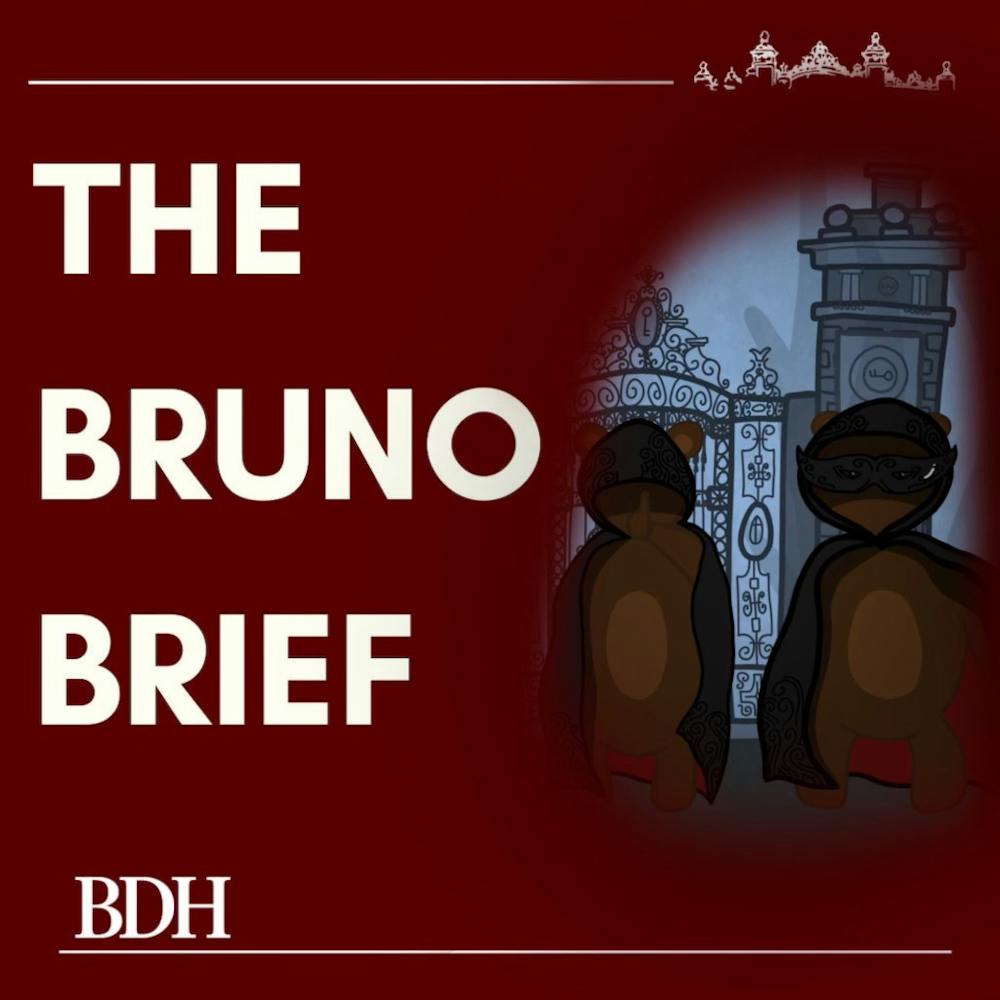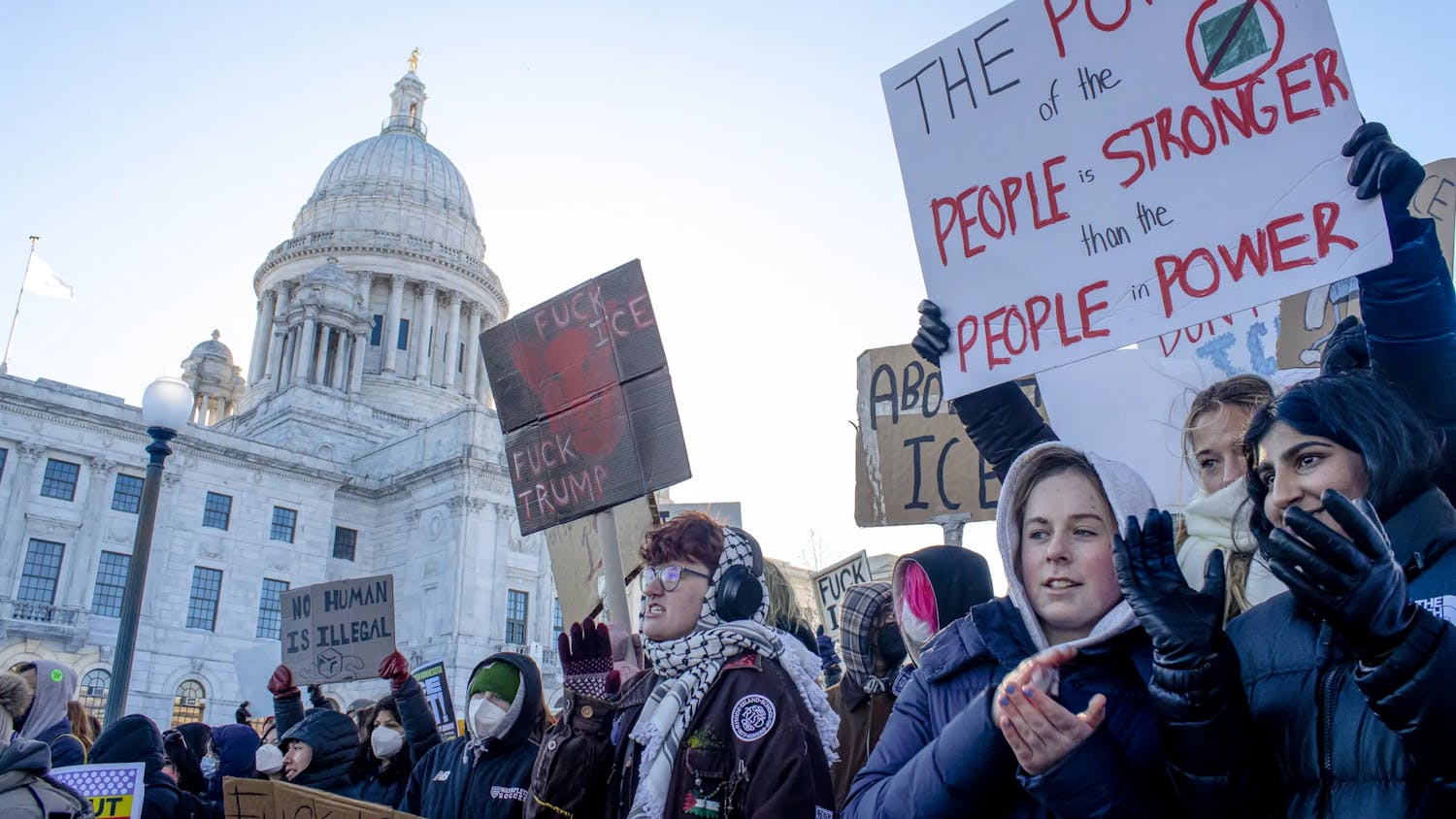In the first episode of The Bruno Brief’s series on myths at Brown, Elysee Barakett, Bruno Brief producer and staff writer, and Daphne Dluzniewski, producer and senior staff writer, talk about their reporting on secret societies on campus. What secret societies exist on campus, and why are they so secret? How have students moved away from campus-affiliated organizations? And how has the influence of Greek “secret societies” on campus evolved?
Subscribe to the podcast on Spotify or Apple Podcasts or listen via the RSS feed. Send tips and feedback for the next episode to herald@browndailyherald.com. The Bruno Brief is produced in partnership with WBRU.
Jack Wrenn
So when students wanted to created organizations that couldn’t function within Brown’s structures, they did so outside of those structures.
Jacob Smollen
“The rise and progress of this society has far exceeded the most sanguine expectations.”
Sophia Decherney
When every senior graduates from Kappa Delta Phi, they leave a copy of their favorite book here and write an inscription of why it's their favorite and why it kinda influenced their life. So if you pull books off the shelf you mostly find ones that seniors have left here and then you can read them and find out why it was a really important book to someone.
Elysee Barakett
To kick off season 5 of The Bruno Brief, we will be tackling secret societies on campus as part of our series on myths at Brown. What secret societies exist on campus, and why are they so secret? How have students moved away from campus-affiliated organizations? And how has the influence of Greek “secret societies” on campus evolved? My name is Elysee Barakett, Bruno Brief producer and staff writer, and this is The Bruno Brief.
Producer and senior staff writer Daphne Dluzniewski and I spoke with different organizations on campus to learn about where these secret societies came from and where they are going.
Daphne Dluzniewski
There was really only one secret society that we tried to investigate.
Daphne Dluzniewski (Interview Audio)
And what do you know about the state of secret societies now and I guess specifically about Societas Domi Pacificae or Pacifica House?
Daphne Dluzniewski
Societas Domi Pacificae, also known as Pacifica House, is one of the only secret societies that persists on Brown’s campus today.
Using the Wayback Machine, you can find Pacifica House’s defunct website from the 2000s. The website slowly disappeared over the years, but a 2005 version includes claims that SDP originated in 1824 as the Franklin Society, an on-campus literary organization. But we went to the Hay Archives and uncovered that the Franklin Society was actually founded in 1823.
*Audio from Jacob Smollen and Elysee Barakett’s trip to The Hay*
Jacob Smollen
Look at how old. This looks like a haunted book.
It was established on July 4, 1823.
Daphne Dluzniewski
Minutes from the Franklin Society start in July of that year, with discussions about who would be president and the organization's constitution.
According to Jack Wrenn PhD’21, founder of the Inning Club, which is dedicated to archiving otherwise unrecorded facets of the University, this points to the idea that Pacifica House’s origins may be more recent than they claim.
Elysee Barakett
The Herald reviewed an email that Pacifica House leadership sent to potential members to nominate them into the society. The email goes:
“Hello,
You have been nominated for a position in the Society of the Pacifica House.
…
This process requires absolute discretion; all nominations, and the contents of this email, are confidential. Send your application to (the Pacifica House email). Tell no one.
Sincerely,
Societas Domi Pacificae”
Elysee Barakett
The email also asks for a resume, unofficial transcript, writing sample and 250-500 word short-answer questions, like “the most important issue that Brown will face in the next five years.”
Daphne Dluzniewski
The April 2005 Pacifica House website also references a 2002 report to the University on grade inflation as part of their “focus on reviving intellectual diversity, improving administrative robustness and strengthening the University's institutional reputation.”
The report, which the Inning Club found and later published, reads that “the role of Pacifica House in this broadening debate is one of tactical observation as well as active interlocution.”
The report warns about the prevalence of grade inflation among Ivy League schools and urges Brown to address the problem to protect its academic integrity.
Elysee Baraket
We found the names of several alleged Pacifica House members and reached out to them for comment, but no one responded — shockingly.
Daphne Dluzniewski
Secret societies have a complicated history on campus. Through an Encyclopedia Brunoniana written by Martha Mitchell, we learned about the history of Brown’s Greek organizations. The University considered Greek organizations to be secret societies when they first started popping up on campus in the 1830s, but most members no longer consider themselves to be part of a secret group. In 1844, the University voted that it was against the establishment of secret societies and sought to suppress them. But since then, measures have been put in place to increase the transparency between the University and Greek life organizations, with former president Henry Wriston even being pro-Greek life. Here’s Jack Wrenn:
Jack Wrenn
The history of Secret societies at Brown has very much a history of the interplay between University administrative control and student desires for socialization. And so when students wanted to create organizations that couldn't function within brown structures, they did so outside of those structures.
Daphne Dluzniewski
This was as far as we got in our investigation into Pacificae House, so we began to explore other groups that exist on campus. We definitely got mixed reactions on our reporting. A lot of groups didn’t want to share their secrets with us, so it was pretty challenging to find sources.
Elysee Barakett
I met up with two members of a former Greek life organization that was removed from campus in recent years.
Elysee Barakett
I'm coming back from Joe's right now. They basically met with me just to tell me that they didn't want me including them in the story. And then they also said: “Did you really think you could get secret societies to talk to you about, being secret for this episode?” But it's all good. They made some good points. I'm persisting and reaching out to a few more organizations and we will see how it goes.
Daphne Dluzniewski
The influence of Greek life on campus has also changed over time. A 1932 article from The Herald reported that in 1915, 73% of Brown students were fraternity members. In 1949, that number dropped to 30%, but 90% of elected offices on campus were still held by members of fraternities.
Elysee Barakett
Alpha Delta Phi came to Brown in 1836. The group is a literary society devoted to the pursuit of knowledge, and it is the oldest on-campus Greek organization, which formed initially as an all-male organization. When Brown became co-ed after fully merging with Pembroke College, the former coordinate women’s college to the University, Alpha Delta Phi became one of the first on-campus Greek organizations to welcome people of all genders.
I spoke with Sophia Decherney ’25, the president of Alpha Delta Phi, to learn more about the organization.
Sophia Decherney
There was initially a big fight about that with the National chapters between the chapters that wanted that and didn't. And Brown was one of the leading chapters to change it and did huge rallies and some of the original speakers just spoke at our last convention and said that they, it was like a very fearful time other fraternity, not ADPhi, would come to meetings and actually physically threaten the women and try and make sure fraternities didn't go co-ed. But they did prevail and about half of the chapter separated from national and became gender inclusive.
Elysee Barakett
Decherney joined Alpha Delta Phi kind of as a mistake.
Sophia Decherney
I was a very confused freshman. And I saw the sign for Twilight trivia night and I thought, ‘Oh, I've read Twilight. I will make friends who have also read Twilight.’ So I showed up and I did see that they were Greek letters on the door, but I kind of thought ‘Oh, they like classics. I'm a fan of classics. Those are some Greek letters.’ And then it did turn out to be the Greek Life organization.
Elysee Barakett
The society also has a strong alumni network, which support ADP both financially and in keeping up with old traditions.
Sophia Decherney
We see them fairly often. We just had one of our alumni back here last week to do a chainmail making tutorial… There's a lot of ADP alumni who have married each other. So we’ve arranged quite a few alumni proposals.
Elysee Barakett
Decherney gave me a tour of ADP’s different rooms that are located in a tunnel that runs below Wriston Quad. Each space was different — from their log-cabin-like billiards room to their stunning library, with an old book smell. The tunnel used to provide direct access to the Ratty, a route that is now shut off. The walls are covered with colorful and witty murals with references to iconic art, literature and politics.
Sophia Decherney
Yeah we have quite a few social rooms. We have, downstairs we have a lounge as well. We have the lounge upstairs. That's our big one. We have the library. We have a tea room. We have a kitchen, the movie theater and the billiard games room
Daphne Dluzniewski
Students had different views on the current state of Greek life on campus, but most agreed that while participation in traditional Greek life is declining, more and more students are turning to unaffiliated program houses.
Giordana Fiorentino
I would say that it's declining.
Elysee Barakett
That was Giordana Fiorentino ’24, the President of Brown Women’s Collective, who joined the group after she transferred to Brown last year.
Giordana Fiorentino
I felt that BWC was a really good mixture of both social events but also learning opportunities, career growth and academic growth.
Elysee Barakett
BWC was founded in 2020 after 91% of Kappa Alpha Theta members disaffiliated from the organization that Fiorentino said had a “history of racism and classism and was exclusionary in other ways.” The Herald previously reported on the topic with Abby Yuan ’21, a member of the sorority, citing concerns about the organization’s financial inaccessibility and slow implementation of diversity initiatives.
Daphne Dluzniewski
I also spoke with Leanna Kish '25, a member of Kappa Delta, about whether she thought there may still be some sort of secrecy surrounding Greek life.
Leanna Kish
I think there’s a lot of misconceptions around Greek life, which can make it seem really mysterious. Because I know like going in, I thought that it was kind of secretive because like, no one ever talked about it. I think a lot of people think that it's like a hidden aspect of Brown, when in reality, it's just because we don't have a lot of members.
Daphne Dluzniewski
Brown’s absence of significant Greek Life or secret clubs typical of other Ivy Leagues can supply existing student groups with an added level of intrigue. But even when you probe into groups a little further, you see that, at their core, these groups can simply be a place for students to find community. And the secrecy just adds a little fun.
Elysee Barakett
Still feeling curious about the tunnels we mentioned earlier? I know we are! Tune in next week to hear from Finn Kirkpatrick, section editor, about all the mysterious tunnels under campus and their controversial history.
Daphne Dluzniewski
This episode was produced by Elysee Barakett, Liana Haigis, Matias Gersberg, Finn Kirkpatrick, Jacob Smollen and me, Daphne Dluzniewski. If you enjoyed this episode, be sure to subscribe to The Bruno Brief and leave a review. Thanks for listening.





